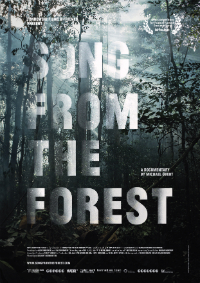Obert Plays A Polyrhythmic Requiem of Cultural Sovereignty
Director Michael Obert’s VPRO IDFA Award winning, SXSW imported Song from the Forest meditatively chronicles the aloof livelihood of Louis Sarno, an American whose interest in the exotic musical stylings of the Central African Bayaka Pygmy tribes led him away from his disheartening city dwelling to a permanent life of hunting, gathering, ethnographic field recording and eventually, fatherhood, and in doing, the vibrant songs of celebration once captured in moments of profound communal exuberance begin to seem more like tragically transitional requiems mourning the loss of an irreplaceable culture on the outs. Sarno himself and the traditional ways of the Bayaka lifestyle are beginning to fade, his health and spirits waning as globalization encroaches upon the forest he’s called home for the last 25 years. Embraced by the native community as one of their own, he remains an alien interloper of sorts, subsisting not through traditional means, but economic acumen ingrained back in the states. It’s a complex ethical position to find one’s self, and Obert contextualizes his subject’s duress in stark reminisce and an engulfing soundscape of jungle ambiance and polyrhythmic melodies set against systematized metropolitan imagery that feels all too easy, yet still profound in its simplicity.
Holding a promise pledged long ago, Sarno decides to take his 13-year-old son, Samedi, on a trip to New York City, furthering complicating the divide between urbanization and ethnographic conservation. Their journey out of the jungle begins with a ferryman urging Sarno to allow his son a stateside education, knowing all too well that scholarship credentials will soon be of more importance than hunting skills. Having listened to the man express his reasons for leaving the states for most of the first half of the film, you can feel just how painful this recommendation is for him. And what’s worse, he knows he’s right. Upon their arrival, Samedi sets his eyes on the immensity of skyscrapers and the bizarity of American daily life for the first time. He’s appalled by the food. He’s entranced by street dancers. He meets his American cousins for the first time, as well as Sarno’s best friend from college, Jim Jarmusch. He’s gifted age appropriate toys, but the kid insists on a gun. It’s disheartening and a bit frightening because you know he’s unaware of the American fears associated with children with guns and, more importantly, that his wishes are warranted. He not only wants a new tool for bringing home dinner, but a weapon to protect his village from the ever encroaching, AK-toting poachers that threaten the future of their entire ecosystem.
In New York, Sarno admits that he doesn’t know if he can continue living as he has for the last few decades. He’s having major health issues due to complications from long harbored Hepatitis B and he’s broke to boot. To his rainforest community, he’s known as the white one, there to document their musical history, as well as for financial support in the event of emergencies. In a Pygmy folk tale recounted twice in the film, the white man is a spectral figure, a deceased native drained of his color and supernaturally reanimated to oversee the tribe. Whether he likes it or not, Sarno has assumed this role, an adoring shepherd, a fading apparition. Song from the Forest celebrates Sarno’s moral devotion to the musical lineage of his beloved Pygmy brethren with a forlorn pensivity. It’s not quite a swan song, but it’s certainly a mournful coda that reluctantly begs the attention of those who threaten their cultural autonomy.
★★★/☆☆☆☆☆
Reviewed on March 12th at the 2014 SXSW Film Festival – Documentary Feature Competition. 92 Min



